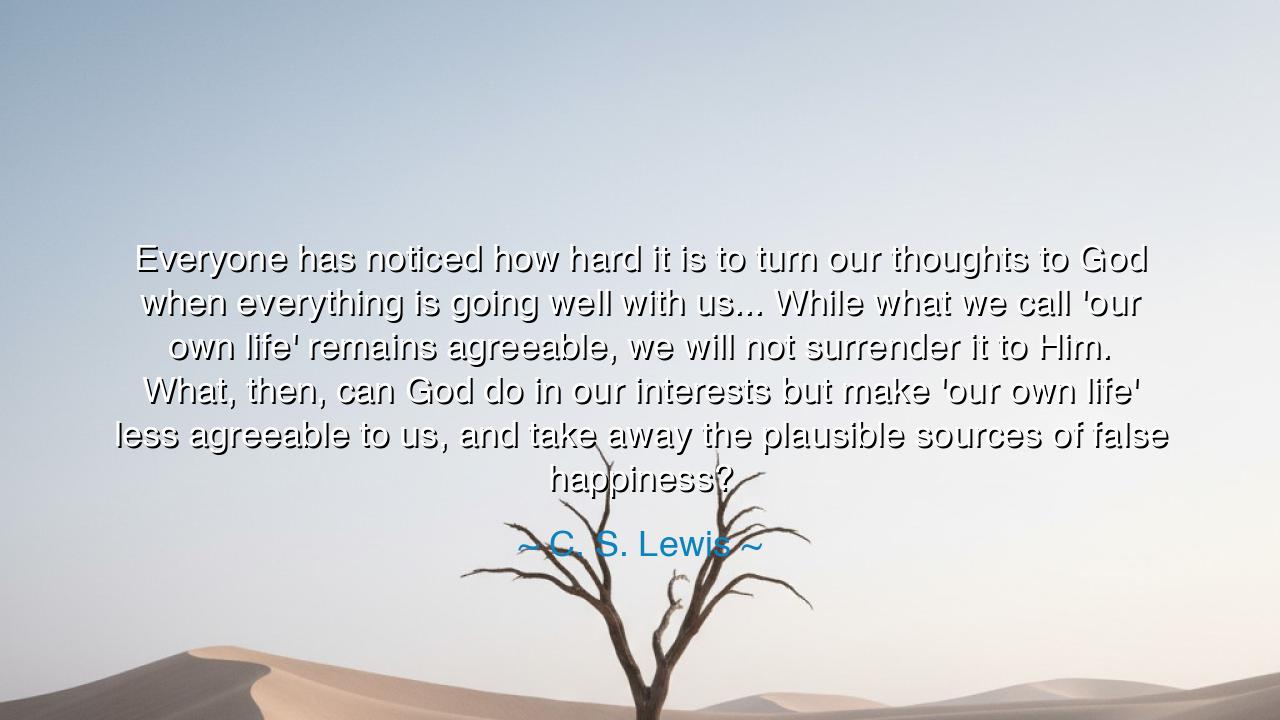
Everyone has noticed how hard it is to turn our thoughts to God
Everyone has noticed how hard it is to turn our thoughts to God when everything is going well with us... While what we call 'our own life' remains agreeable, we will not surrender it to Him. What, then, can God do in our interests but make 'our own life' less agreeable to us, and take away the plausible sources of false happiness?






The wise C. S. Lewis, in his meditation upon suffering and faith, wrote these piercing words: “Everyone has noticed how hard it is to turn our thoughts to God when everything is going well with us... While what we call 'our own life' remains agreeable, we will not surrender it to Him. What, then, can God do in our interests but make 'our own life' less agreeable to us, and take away the plausible sources of false happiness?” Here, Lewis does not speak as a theologian alone, but as one who has walked through fire and discovered that pain can be a doorway to grace. His words uncover a truth that the ancients also knew—that comfort dulls the soul, but suffering awakens it. For as long as life pleases us, we believe we are masters of it; only when it breaks do we remember the Master Himself.
In these lines, Lewis continues the lineage of old philosophers and prophets who understood the divine purpose hidden in sorrow. The Stoics said that adversity is the forge of the spirit; the Psalms cry that “it was good for me that I was afflicted, that I might learn Thy statutes.” To the modern ear, such wisdom may seem cruel, but it is the tenderness of truth. When all is well, when wealth and pleasure fill our days, we rarely lift our eyes beyond the horizon of our own desires. We grow enchanted by the illusion of self-sufficiency, mistaking temporary delights for eternal joy. This is what Lewis calls the false happiness—the narcotic comfort that lulls the soul into forgetting its source.
And so, in divine mercy, God removes our illusions. He allows the world to bruise us, not as punishment, but as awakening. The blows that shatter our idols are not the cruelty of fate, but the discipline of love. Lewis saw this truth not in theory, but in the furnace of his own life. When he lost his beloved wife Joy to illness, he was torn between anguish and faith. Yet even there, amid his mourning, he came to see that grief stripped away the false joys that once veiled his vision. It forced him to confront the reality that nothing in this world could satisfy the eternal hunger of the heart. Thus, pain became the teacher that pleasure never was.
This is a lesson as old as time. Recall the story of Job, the man of great faith who was blessed with abundance, family, and peace—until all was taken from him. In his suffering, he cried out to God, demanding understanding. And though the heavens seemed silent, Job’s soul was transformed. He discovered that faith rooted in comfort is shallow, but faith that endures through loss becomes unbreakable. Like gold refined by fire, his spirit emerged purified. Job’s story, like Lewis’s reflection, teaches that sometimes the path to true happiness runs through the valley of despair, for it is there that the soul learns to depend not on the fragile gifts of life, but on the Giver Himself.
What Lewis calls “our own life”—the agreeable, self-contained existence we build from comfort and control—is the very thing that often stands between us and God. We cling to it because it feels safe, yet it blinds us to our deeper purpose. When life is kind, we imagine we need no saving; when it is harsh, we begin to seek salvation. Thus, what we call tragedy may be the turning of a divine key, unlocking the door to humility, gratitude, and spiritual sight. The ancients would say that a storm reveals the captain, not the calm. In the same way, hardship reveals the soul’s strength—and its need for the divine anchor.
Yet, this truth does not ask us to seek pain or despise joy. Rather, it calls us to remember the Source of both. When joy comes, we should receive it with thanksgiving, not pride; when suffering comes, we should endure it with trust, not despair. To walk with God is to see His hand in both—the hand that gives and the hand that takes away, yet never ceases to guide. For every loss that wounds us may, in time, reveal a greater wholeness. Every comfort removed may make room for a deeper peace.
Therefore, my child, do not curse the days of discomfort, nor envy the easy paths of others. When life grows “less agreeable,” as Lewis says, see in it not punishment, but invitation—the call to awaken, to release your grip on the temporary and grasp what is eternal. Cultivate gratitude in both sunshine and shadow. Pray not for an untroubled life, but for an unshakable heart. And when the sources of false happiness dry up, look not backward in bitterness, but upward in faith—for that emptiness is not the end, but the clearing through which true joy will one day enter.
For in the end, God takes nothing from us that we truly need; He only removes the illusions that keep us from knowing that all we need is Him.






AAdministratorAdministrator
Welcome, honored guests. Please leave a comment, we will respond soon